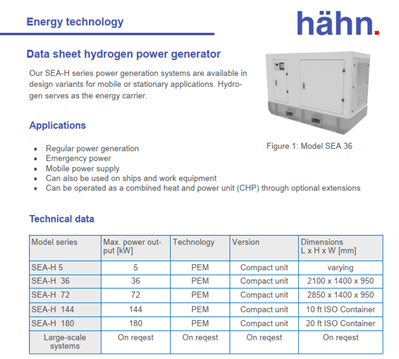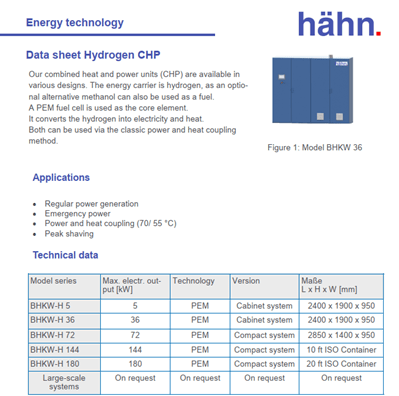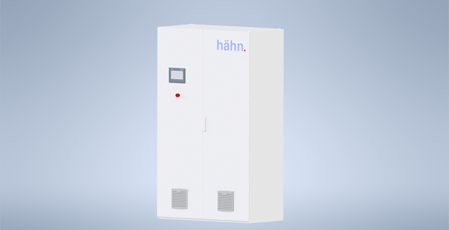fuel cell systems

Mobile fuel cell power generators
The hähn hydrogen mobile power generators are turnkey fuel cell technology with a modern power pac as the core element.
Hydrogen or methanol are used as fuels. In the case of methanol, a methanol reformer is built in, which converts the methanol back into hydrogen.
In the basic configuration, the systems are designed for stand-alone operation, i.e. they supply the consumers directly. With additional modules, the systems can also operate as emergency power systems or in parallel with the grid.
The systems are ready for immediate operation as plug-and-use systems. In addition to our tried-and-tested standard versions for various requirements, we also offer customized systems.
The SEA series includes various sizes of mobile power generators. Please feel free to contact us. The data sheets are available here.

Data sheet haehn hydrogen fuel cell power generator (pdf)
Stationary fuel cell combined heat and power units (CHP units)
The hähn hydrogen CHP series is similar to our mobile power generators. Hydrogen or methanol are used as fuels. The core element here is a modern Power Pac; in the case of methanol as fuel, a methanol reformer is used.
The difference to our mobile power generators is that our CHP units are installed as stationary units and ensure heat extraction at 70°C.
The CHP series comprises various output classes. You can find them in our data sheets.
Power Pacs hähn hydrogen
Power Pacs are the core element of a fuel cell. They contain the fuel cell stack as well as the most important auxiliary units, e.g. the control system.
In addition to turnkey fuel cell products, mobile power generators and stationary CHP units, power pacs are also available separately from hähn hydrogen.
Knowledge to go
- Fuel cells
-
Hydrogen fuel cells offer an off-grid power supply and low-noise, low-emission drives.
In fuel cells, the hydrogen supplied is converted into electrical energy. In a fuel cell, the electrolysis reaction therefore takes place in reverse: in addition to the electrical energy, the only reaction product is water. This is why the previously obtained hydrogen is often referred to as being "converted back into electricity".
- Areas of application
-
Energy and heat: electrical energy adapted to demand in mobile power generators or stationary combined heat and power plants. Microgrids.
Mobility: emission-free and noise-reduced drives. The only combustion product is water.
- Energy
-
Fuel cells enable a power supply even where there is no grid coverage. Thanks to their self-sufficiency, they offer security of supply even if higher-level grids are disrupted.
They supply demand-adapted electrical energy in mobile power generators or stationary combined heat and power plants and play a central role in microgrids. They can also be used reliably in the area of emergency power supply or control energy.
- Mobility
-
Fuel cells enable low-noise and low-emission drives in rail and heavy goods transportation, in shipping and in aircraft as well as in construction machinery or work machines, etc.
Fuel cells replace fossil fuel-powered combustion engines and ensure sustainable propulsion where electric battery systems reach their limits due to insufficient capacity.
Hydrogen fuel cells offer an off-grid power supply and low-noise, low-emission drives.
In fuel cells, the hydrogen supplied is converted into electrical energy. In a fuel cell, the electrolysis reaction therefore takes place in reverse: in addition to the electrical energy, the only reaction product is water. This is why the previously obtained hydrogen is often referred to as being "converted back into electricity".
Energy and heat: electrical energy adapted to demand in mobile power generators or stationary combined heat and power plants. Microgrids.
Mobility: emission-free and noise-reduced drives. The only combustion product is water.
Fuel cells enable a power supply even where there is no grid coverage. Thanks to their self-sufficiency, they offer security of supply even if higher-level grids are disrupted.
They supply demand-adapted electrical energy in mobile power generators or stationary combined heat and power plants and play a central role in microgrids. They can also be used reliably in the area of emergency power supply or control energy.
Fuel cells enable low-noise and low-emission drives in rail and heavy goods transportation, in shipping and in aircraft as well as in construction machinery or work machines, etc.
Fuel cells replace fossil fuel-powered combustion engines and ensure sustainable propulsion where electric battery systems reach their limits due to insufficient capacity.
iph Hähn GmbH
Konrad-Zuse-Str. 9 | DE-53560 Vettelschoß | fon 02644-98 02 96 | info@iph-haehn.de | www.iph-haehn.de
Images on this page from top left to bottom right: scharfsinn86 - stock.adobe.com; iph Hähn GmbH; iph Hähn GmbH


